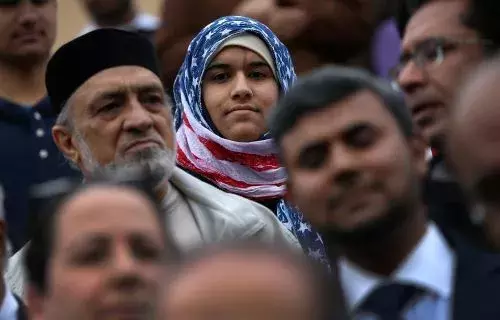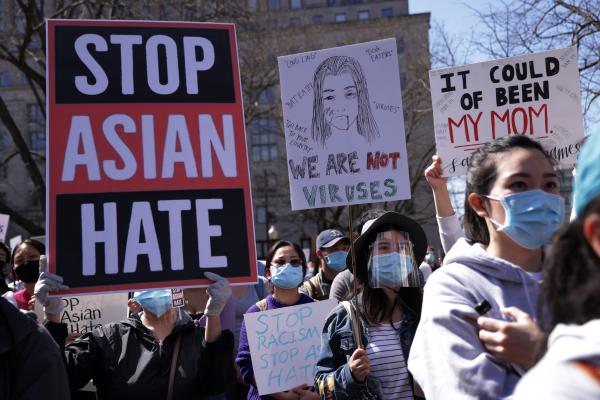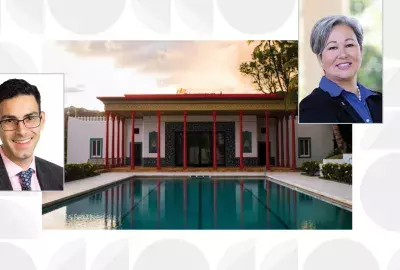Error message

Quick take:
- Attacks against Asian Americans have been on the rise during the pandemic and may increase further as the country reopens.
- With close attention to the issue in the Biden administration and Congress, US Rep. Ted Lieu said the community is now in a different political era.
- Some advocacy groups have pressed for more Asian / Pacific Islands representation in President Biden’s cabinet.
- Incidents are also up in countries such as Canada, Australia and New Zealand, leading some to call for involvement by international institutions like the UN and World Bank.
HONOLULU (May 5, 2021) — Attacks against people of Asian descent aren't new in the history of the United States, but the political landscape in the wake of a spike in anti-Asian incidents is different, US Rep. Ted Lieu told attendees at a recent East-West Center online seminar, "EWC Live: Asian Americans Unsilenced.”
Some view the latest developments as the continuing saga of Asian maltreatment in the US given acts of past discrimination, among them the 1882 Chinese Exclusion Act, incarceration of Japanese Americans during World War II, and the 1982 murder of Vincent Chin by Detroit autoworkers. But after a sharp rise in hate-related incidents stoked by anti-China rhetoric and the Atlanta shooting in March that left six Asian women dead, the issue of anti-Asian hate is drawing increased attention "from the very highest level of our government," Lieu said.
Political Awakening
The congressman pointed to President Bidenʻs speech on March 11 during which he addressed bias and violence against Asians and Pacific Islanders. Lieu also said Congress now has the highest number of Asian Americans in history, and there is growing support for legislation he co-authored that would make it easier to prosecute race-related hate crimes. "Had all of this (political activism) been happening in World War II, I'm not sure if Japanese Americans would have been interned," Lieu said. "I think we're in a different political environment. I think you're seeing the political awakening of the Asian American community."

With the numbers of anti-Asian cases projected to grow, panelists speaking at the "EWC Live: Asian Americans Unsilenced" seminar called for more activism and collaborations with other ethnic groups. Between March 2020 and February 2021, Stop AAPI Hate reported, 3 ,795 accounts of anti-Asian incidents, including assaults, coughing or spitting, verbal harassment and refusal of service. Chinese made up the largest targeted group at over 42.2%, followed by Koreans (14.8%), Vietnamese (8.5%), Filipinos (7.9%) and Japanese (6.9%). Women reported experiencing hate incidents more than twice as often as men.
Manjusha Kulkarni, Executive Director of the Asian Pacific Policy and Planning Council and co-founder of Stop AAPI Hate, said many of the hate incidents occurred at businesses and on public streets and sidewalks, but she expects more school-related, anti-Asian cases in the days ahead. Many of the country's schools and universities have been in hybrid mode because of the pandemic, she said, "and so we do expect that number to increase once we go back to in-person learning."
Kulkarni said research in Canada, Australia and New Zealand show similar increases in anti-Asian incidents, making the point that this is not just an American phenomenon. Some of the solutions may have to involve international organizations like the World Bank and the United Nations, she said.
Improving Media and Entertainment Representation
Actor Rizwan Manji told seminar attendees that the "foreigner syndrome" carries over to the entertainment business, which he said contributes to perceptions about Muslims and Asian Americans. He recalled after 9/11 only being offered roles as a terrorist. Manji, who starred in the Canadian situation comedy "Schitt's Creek" and NBCʻs "Outsourced," said the industry is producing more works that include Asians but not frequently enough. "We need to have something that brings us to that next level," he said.
For a long time, he observed, South Asians were not included in larger Asian collaborations. He said he feels that is changing and that there was a "joining of the hands" in the last political season.
Part of the coalition-building of the Asian Pacific American Institute for Congressional Studies brings together Asian and Pacific Islander (AAPI) interns and fellows with their counterparts in groups like the Congressional Hispanic Caucus Institute and the Congressional Black Caucus Foundation, said Madalene Xuan-Trang Mielke, APAICS president and CEO. Mielke said it is important in the current environment for the AAPI community to be represented and participate in policy decision-making.
Her group was vocal in pressing Biden to include Asian and Pacific Islands members in his cabinet, especially considering the work it did in the last political cycle. "It was something we chose to use as a way to notify the (Biden) administration that in terms of representation, they should build a bigger table," she said.
Representation in and by the media needs improving as well, said Kimmy Yam, NBC Asian America reporter. She called for more nuanced, sensitive coverage of Asian communities by knowledgeable reporters. "For journalists to come in and cover these marginalized communities, it shouldn't be looked at as just this added bonus," she said. Rather, it should be folded into daily coverage.
The public is often introduced to Asian communities through tragedy and that is not their full stories, Yam said. "There's so much depth to us,” she said. “So I would challenge people to put in the time, get to know the community, and then report," Yam said. "It matters that we all get this right."
Quick take:
- Attacks against Asian Americans have been on the rise during the pandemic and may increase further as the country reopens.
- With close attention to the issue in the Biden administration and Congress, US Rep. Ted Lieu said the community is now in a different political era.
- Some advocacy groups have pressed for more Asian / Pacific Islands representation in President Biden’s cabinet.
- Incidents are also up in countries such as Canada, Australia and New Zealand, leading some to call for involvement by international institutions like the UN and World Bank.
HONOLULU (May 5, 2021) — Attacks against people of Asian descent aren't new in the history of the United States, but the political landscape in the wake of a spike in anti-Asian incidents is different, US Rep. Ted Lieu told attendees at a recent East-West Center online seminar, "EWC Live: Asian Americans Unsilenced.”
Some view the latest developments as the continuing saga of Asian maltreatment in the US given acts of past discrimination, among them the 1882 Chinese Exclusion Act, incarceration of Japanese Americans during World War II, and the 1982 murder of Vincent Chin by Detroit autoworkers. But after a sharp rise in hate-related incidents stoked by anti-China rhetoric and the Atlanta shooting in March that left six Asian women dead, the issue of anti-Asian hate is drawing increased attention "from the very highest level of our government," Lieu said.
Political Awakening
The congressman pointed to President Bidenʻs speech on March 11 during which he addressed bias and violence against Asians and Pacific Islanders. Lieu also said Congress now has the highest number of Asian Americans in history, and there is growing support for legislation he co-authored that would make it easier to prosecute race-related hate crimes. "Had all of this (political activism) been happening in World War II, I'm not sure if Japanese Americans would have been interned," Lieu said. "I think we're in a different political environment. I think you're seeing the political awakening of the Asian American community."

With the numbers of anti-Asian cases projected to grow, panelists speaking at the "EWC Live: Asian Americans Unsilenced" seminar called for more activism and collaborations with other ethnic groups. Between March 2020 and February 2021, Stop AAPI Hate reported, 3 ,795 accounts of anti-Asian incidents, including assaults, coughing or spitting, verbal harassment and refusal of service. Chinese made up the largest targeted group at over 42.2%, followed by Koreans (14.8%), Vietnamese (8.5%), Filipinos (7.9%) and Japanese (6.9%). Women reported experiencing hate incidents more than twice as often as men.
Manjusha Kulkarni, Executive Director of the Asian Pacific Policy and Planning Council and co-founder of Stop AAPI Hate, said many of the hate incidents occurred at businesses and on public streets and sidewalks, but she expects more school-related, anti-Asian cases in the days ahead. Many of the country's schools and universities have been in hybrid mode because of the pandemic, she said, "and so we do expect that number to increase once we go back to in-person learning."
Kulkarni said research in Canada, Australia and New Zealand show similar increases in anti-Asian incidents, making the point that this is not just an American phenomenon. Some of the solutions may have to involve international organizations like the World Bank and the United Nations, she said.
Improving Media and Entertainment Representation
Actor Rizwan Manji told seminar attendees that the "foreigner syndrome" carries over to the entertainment business, which he said contributes to perceptions about Muslims and Asian Americans. He recalled after 9/11 only being offered roles as a terrorist. Manji, who starred in the Canadian situation comedy "Schitt's Creek" and NBCʻs "Outsourced," said the industry is producing more works that include Asians but not frequently enough. "We need to have something that brings us to that next level," he said.
For a long time, he observed, South Asians were not included in larger Asian collaborations. He said he feels that is changing and that there was a "joining of the hands" in the last political season.
Part of the coalition-building of the Asian Pacific American Institute for Congressional Studies brings together Asian and Pacific Islander (AAPI) interns and fellows with their counterparts in groups like the Congressional Hispanic Caucus Institute and the Congressional Black Caucus Foundation, said Madalene Xuan-Trang Mielke, APAICS president and CEO. Mielke said it is important in the current environment for the AAPI community to be represented and participate in policy decision-making.
Her group was vocal in pressing Biden to include Asian and Pacific Islands members in his cabinet, especially considering the work it did in the last political cycle. "It was something we chose to use as a way to notify the (Biden) administration that in terms of representation, they should build a bigger table," she said.
Representation in and by the media needs improving as well, said Kimmy Yam, NBC Asian America reporter. She called for more nuanced, sensitive coverage of Asian communities by knowledgeable reporters. "For journalists to come in and cover these marginalized communities, it shouldn't be looked at as just this added bonus," she said. Rather, it should be folded into daily coverage.
The public is often introduced to Asian communities through tragedy and that is not their full stories, Yam said. "There's so much depth to us,” she said. “So I would challenge people to put in the time, get to know the community, and then report," Yam said. "It matters that we all get this right."
East-West Wire
News, Commentary, and Analysis
The East-West Wire is a news, commentary, and analysis service provided by the East-West Center in Honolulu. Any part or all of the Wire content may be used by media with attribution to the East-West Center or the person quoted. To receive East-West Center Wire media releases via email, subscribe here.
For links to all East-West Center media programs, fellowships and services, see www.eastwestcenter.org/journalists.







